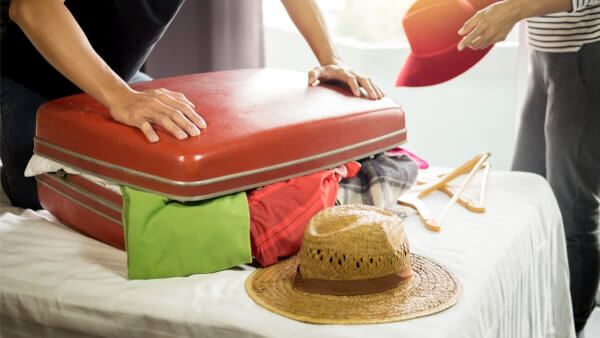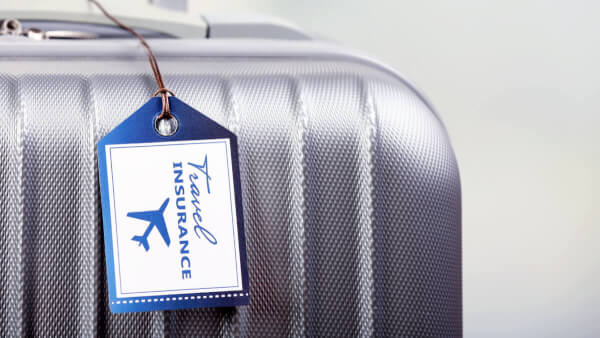How to get an Airpoints card: A complete guide for Kiwis
A complete guide on how to get an Airpoints card for Kiwis. Learn how to earn Airpoints, what you can do with them and more.

Excited about an adventure to Europe? More New Zealanders are prioritising longer trips to far-flung destinations and there’s not much that can rival a city-hopping trip to Berlin, Copenhagen, London, Paris, and more1.
Whether you just want to see all the top attractions or study or work on the continent, there are a few travel requirements to sort out first.
This blog will detail the enticing visa-free options available to NZ citizens and cover some handy customs, finance, and mobile tips to prepare you for your journey. We'll also introduce the Wise travel card – your perfect companion for managing expenses on your travels abroad. Wise offers the mid-market exchange rate with no markups and transparent fees to help save on international transactions.
| Table of contents |
|---|
Europe is very welcoming to New Zealanders with its widespread visa exemptions. You can stay as a tourist and move freely between 26 countries in the Schengen Zone for up to 90 days without applying for a visa2. Most other places outside the EU bloc including the UK also offer visa-free travel.
There’s a bit more paperwork to sort from 2025, though. Both the EU and the UK will soon require all visitors to complete an electronic travel authorisation on arrival3,4.
The Schengen area of Europe is the easiest for New Zealanders to traverse. You can stay here and transit between countries for up to 3 months without a visa or going through border controls.
What’s more, 17 countries within this area also have bilateral visa waiver agreements with New Zealand3. This allows you to move for up to 3 months in each country. These countries are:
While you won’t need a visa for short stays, you must enrol on the European Travel Information and Authorisation System (ETIAS). This is set to come into force at some point in 2025, but the official launch date for the system has yet to be confirmed as of publishing this article. Make sure to check the official ETIAS website for up-to-date guidance before you travel to Europe.
It’s important to note that long-stay visas differ by country and are not Schegen-wide2. If you acquire a work or study visa for France, for example, you won’t be able to use it in Germany. You must apply for a separate visa or permit.
Here’s how it would work in a few European countries:
The visa exemption for NZ citizens is even longer in the UK, lasting up to six months3. This allows you to visit England, Scotland, Wales, and Northern Ireland just by presenting your passport and electronic travel authorisation (ETA).
The ETA is also a new requirement for 2025, effective from 8 January6. New Zealanders can apply for this now by downloading the 'UK ETA' app on the Apple App Store and Google Play7.
The UK’s six-month visa waiver is quite relaxed in its requirements. You can see the sights and spend time with family and friends. You also have access to the privileges extended to a 'Standard Visitor'. This includes minor business activities, and getting private medical treatment8.
However, you can’t work or live there for long periods. Common non-immigrant visa types for the UK include skilled worker, short-term study, and transit.
There are only four countries in Europe — not just the EU — that don’t offer visa-free arrangements for stays up to 3 months for New Zealanders. These are Belarus, Moldova, Russia, and Ukraine3.
If you aren’t travelling to a destination in the Schengen area or the UK, we recommend visiting the local embassy website for these countries for clarity on the visa requirements for NZ citizens.
Residence permit holders may not qualify for the same visa waivers as NZ citizens. Visa requirements for Europe are based on nationality. If this applies to you, we recommend checking eligibility criteria according to your passport’s country of issue.
Most sightseeing and recreational trips to Europe don’t require a visa. However, if you are planning to study or work on the continent, or stay longer than 1 or 2 months, you will need to apply for a relevant visa.
The exact procedure for visa applications will differ by country. Here’s a quick step-by-step guide for a common process:
This is just a general guide. Every country will have their own visa application system. You may even be able to apply online. Contact the local embassy or visit the official website for more information about applying for a visa.
There are no direct flights to countries in Europe, but there are lots of routes from major NZ airports with connecting flights and layovers in Asia or the Middle East.
Airlines operating between New Zealand and Europe include:
Be prepared for a long trip to all destinations in Europe. However, the 12-hour time difference means flights that depart from NZ in the morning can arrive later that day.
Here are some flight times including layovers:
| Flight | Time | Common Stops |
|---|---|---|
| Auckland to London | From 26 hours | Dubai, Doha, Singapore |
| Auckland to Athens | From 28 hours | Dubai, Doha, Singapore |
| Wellington to Paris | From 29 hours | Sydney, Dubai, Singapore |
| Christchurch to Rome | From 30 hours | Sydney, Doha, Bangkok |
The EU’s member nations follow the same customs rules9. On arrival, you must declare prohibited and restricted items. These include dangerous goods such as firearms, drugs, and counterfeit items, plus food stuffs including meat and dairy products.
The good news is that you won't have to pass border controls or immigration authorities when travelling between EU countries.
These are the duty-free allowances when travelling to the EU from a non-EU country such as New Zealand10:
The limits increase when travelling between EU countries. For example, if you went from Germany to France, you won’t have to pay duty on up to 110L of beer11.
When travelling outside the EU, customs restrictions will differ.
In the UK, for instance, you can bring in up to 42L of beer, 18L of wine, up to 10,000 GBP in cash and goods worth up to 1,000 GBP in value12. Items above the duty-free limit, and banned or restricted items must be declared. You can do this online before you fly.
If you are travelling to Europe and ticking a few countries off your bucket list, you need to pack in all the necessary documents for a hassle-free trip. Don't forget these:
At some point in 2025, you must also complete the electronic travel authorisation in the EU and UK. However, there are currently no mandatory requirements for health certificates or vaccination records.
Once you’ve readied your documents, it’s time to start thinking about a few day-to-day essentials.
A universal travel adapter or two is a must. The most common plug socket is Type C — also known as the 'Europlug'. However, the UK and Ireland both use the three-pin Type G plug.
You should also take appropriate clothing. The climate can differ greatly. Expect hotter conditions in southern regions like Spain and cooler climes in Scandinavia and the UK. The summer — June to August — is warm to hot in most places, though.
Some basic medical supplies will also come in handy. However, you shouldn’t have any problem sourcing these locally during your stay.
You can take advantage of international roaming to use your NZ SIM in Europe. While convenient, there is the risk of running up a hefty bill. Spark, for example, offers a 14-day ‘roaming data’ pack for 25 NZD in dozens of European countries, but this includes just 2GB of data14.
You might be better off purchasing an eSIM before you travel instead. Airalo has affordable plans that work in 42 countries15. Other eSIMs include AloSIM, Saily, Holafly, and Orange.
If you are visiting more than one country, eSIMs are the most convenient. However, you also have the option of purchasing a local prepaid SIM card at an airport or convenience store on arrival.
Travel insurance is a must for backpacking trips across Europe. You can get multi-country coverage with a single policy for medical emergencies, flight cancellations, and more. If you are planning a long escape, check the terms and conditions to ensure you are covered for all eventualities.
Our guide to the best travel insurance in New Zealand will give you a helping hand in finding a policy that meets your needs.
While Europe is often characterised as a cashless society, there is value in having a mix of the local currency and cards to pay for the things you need.
You might be surprised to hear that cash remains popular in Europe, accounting for 52% of point-of-sale payments in 202420. It’s always good to have some local currency, whatever country you are in. Cash comes in handy for smaller payments in stores, cafés, markets, and on public transport.
20 countries in Europe use the Euro (EU) including France, Germany, Italy, and Spain21. Other non-EU countries will have their own local currency, such as the Pound sterling (GBP) in the UK, and Danish krone (DKK) in Denmark.
We recommend exchanging some cash before you travel. If you leave it all until your arrival, you might run into costly foreign exchange fees and markups on conversion rates. This can be an issue if you are budgeting for a pan-European adventure. There are also plenty of ATMs in most countries for quick top-ups.
For some helpful tips, check out our guide to avoiding foreign ATM fees when traveling abroad 📹
Some major cities are notorious hot spots for pickpockets, though. Don’t take any chances with notes and coins. Keep them stowed in a hidden money belt or deep pocket. And split larger dominations between different locations for safety.
Apple Pay and Google Wallet are widely used in Europe18,19. You can check the official support pages before you travel for country-specific availability.
You won’t have a problem using your NZD cards across Europe. Both Visa and Mastercard are widely accepted. There may even be some spots where card or contactless is the only option. In Norway, for example, just 3% of people use cash, according to a survey by the country’s central bank16.
Europe is a big place, though, and preferences vary by region. One constant is foreign transaction fees. You will have to pay these — typically a small percentage — when using a card with a traditional bank in Europe.17.
Using a multi-currency travel card such as Wise is an excellent alternative with transparent exchange rates and low fees. Available for residents of New Zealand and supported countries, Wise offers the mid-market rate on currency conversions, which is the usually the same rate you see on Google, ensuring that you don’t lose money to extra fees or hidden mark-ups.
Wise offers a convenient travel card and money transfer services that make managing your finances abroad a breeze. The Wise card lets you spend like a local in over 150+ destinations - including Hong Kong.
Here's why Wise is a great choice for your international travels:
Please see terms of use and product availability for your region or visit Wise fees and pricing for the most up to date pricing and fee information.
Sources:
*Please see terms of use and product availability for your region or visit Wise fees and pricing for the most up to date pricing and fee information.
This publication is provided for general information purposes and does not constitute legal, tax or other professional advice from Wise Payments Limited or its subsidiaries and its affiliates, and it is not intended as a substitute for obtaining advice from a financial advisor or any other professional.
We make no representations, warranties or guarantees, whether expressed or implied, that the content in the publication is accurate, complete or up to date.

A complete guide on how to get an Airpoints card for Kiwis. Learn how to earn Airpoints, what you can do with them and more.

Planning your trip with Qatar Airways? Understand their baggage allowance rules for hand luggage, checked bags, and unique items with this guide.

Planning a trip to Europe from New Zealand? We compared top providers based on coverage, fees and more for Kiwis.

Looking for travel insurance for your next trip? We’ve compared two top travel insurance providers in New Zealand, 1Cover vs Southern Cross, to help you decide.

Looking for a suitable travel insurance for seniors in New Zealand? Learn everything you need to know, including coverage, exclusions, and the top providers.

Comparing travel insurance in New Zealand? We've compared Cover-More against Allianz to help you choose the best policy for your next trip.